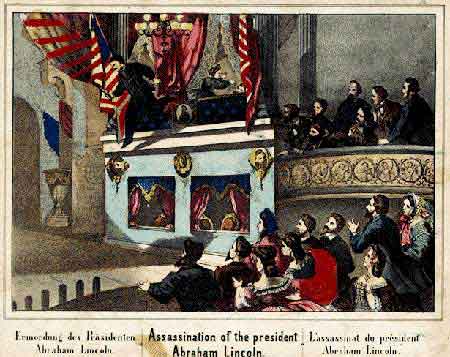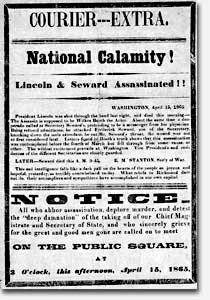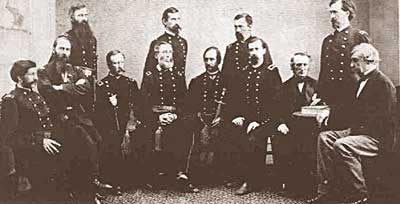34f. The Assassination of Abraham Lincoln

On April 11, 1865, two days after Lee's surrender at Appomattox, Lincoln delivered a speech outlining his plans for peace and reconstruction. In the audience was John Wilkes Booth, a successful actor, born and raised in Maryland. Booth was a fervent believer in slavery and white supremacy. Upon hearing Lincoln's words, he said to a companion, "Now, by God, I'll put him through. That is the last speech he will ever make."
After failing in two attempts earlier in the year to kidnap the President, Booth decided Lincoln must be killed. His conspiracy was grand in design. Booth and his collaborators decided to assassinate the President, Vice President Andrew Johnson, and Secretary of State William Seward all in the same evening. Lincoln decided to attend a British comedy, Our American Cousin, at Ford's Theater, starring the famous actress Laura Keene. Ulysses S. Grant had planned to accompany the President and his wife, but during the day he decided to see his son in New Jersey. Attending the play that night with the Lincolns were Major Henry Rathbone and his fiancée, Clara Harris, the daughter of a prominent Senator.

In the middle of the play that night, Booth slipped into the entryway to the President's box, holding a dagger in his left hand and a Derringer pistol in his right. He fired the pistol six inches from Lincoln and slashed Rathbone's arm with his knife. Booth then vaulted over the front of the President's box, caught his right leg in a flag and landed on the stage, breaking his leg. He waved his dagger and shouted what is reported to be Sic semper tyrannis — Latin for "thus be it ever to tyrants." Some reported that he said, "The South is avenged." He then ran limpingly out of the theater, jumped on his horse, and rode off towards Virginia.
The bullet entered Lincoln's head just behind his left ear, tore through his brain and lodged just behind his right eye. The injury was mortal. Lincoln was brought to a nearby boarding house, where he died the next morning. The other targets escaped death. Lewis Powell, one of Booth's accomplices, went to Seward's house, stabbed and seriously wounded the Secretary of State, but Seward survived. Another accomplice, George Atzerodt, could not bring himself to attempt to assassinate Vice President Johnson.
Two weeks later, on April 26, Union cavalry trapped Booth in a Virginia tobacco barn. The soldiers had orders not to shoot and decided to burn him out of the barn. A fire was started. Before Booth could even react, Sergeant Boston Corbett took aim and fatally shot Booth. The dying assassin was dragged to a porch where his last words uttered were, "Useless ... useless!"

The conspirators in the President's assassination were tried in front of a military tribunal known as the Hunter Commission.





